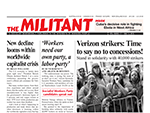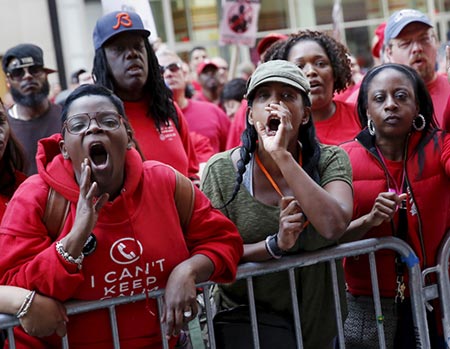The strike by members of the Communications Workers of America and the International Brotherhood of Electrical Workers affects the company’s operations from Massachusetts to Virginia.
“In 2011 we had a lot more people asking, ‘Why are you going on strike?’” during that two-week walkout, said Joe Pacheco. “Now we’re getting more words of encouragement.”
“We’re on strike because we’ve given back in the last three contracts,” striker Tony Mondie told the Militant. “At some point we have to stop going downhill, we have to say, ‘Enough!’”
On the first day of the strike downtown streets echoed with strikers’ chants and truck drivers honking horns in solidarity as some 400 workers gathered at 6 a.m. in front of a Verizon building in midtown Manhattan. Co-workers exchanged embraces, a scene repeated across the city as pickets were dispatched to different locations, including Verizon Wireless stores.
“I think we are getting more solidarity because with harder times a lot more people are aware of the importance of unions,” Anne Wray-Penders, 51, a network services coordinator, said on the picket line April 19.
“Verizon is making billions,” said Rohan Seales, who works at a Verizon construction garage. “Why are they trying to take away the benefits our union has fought for years to get? Workers hired after 2000 have no pension, only a 401(k). They sign a contract with the company for a maximum of two years,” and must start over, never working their way up the wage scale.
“The company doesn’t give us anything,” said Herman Maxwell, a field technician who started working for the company in 1988, when it was called NYNEX. “People have fought for what we have, even given their lives. Gerry Horgan was killed on the picket line in 1989.” Horgan was struck by a vehicle operated by a scab during that four-week strike and died the next day.
Maxwell described how managers track workers on the clock or the GPS. “People are being suspended because they can’t account for where they were for a few minutes,” he said.
The strikers work for Verizon’s landline, Internet and television service of copper wire and fiber optic cable. The company’s lucrative and expanding wireless division is largely nonunion. Organizing the wireless workforce is one of the biggest challenges facing the CWA.
Workers at Verizon’s six wireless retail stores in Brooklyn and one in Everett, Massachusetts, are unionized. “The company fired one of the main organizers, Bianca Cunningham,” CWA Local 1101 steward Fitz Boyce said. “We’re fighting for her. The nonunion store workers are treated worse than we are. The company holds weekly in-house meetings to talk against the union. Some work on commission and their wages are low.”
“The National Labor Relations Board ruled in favor of Bianca’s union complaint,” CWA Local 1109 Vice President Mike Gallo said in a phone interview April 19, “but the company appealed. We’re keeping up the fight as we negotiate a first contract for the Brooklyn store workers.”
Marches, rallies across New York
Hundreds of strikers marched across the Brooklyn Bridge April 14, rallied in downtown Brooklyn and then marched to the Brooklyn Navy Yard, where Democratic presidential hopefuls Hillary Clinton and Bernie Sanders were debating that evening.
Dozens of strikers in high spirits honking all kinds of horns created a din April 18 in front of the Renaissance New York Midtown Hotel where Verizon is housing managers replacing striking workers. Later that morning they and several thousand others rallied at a nearby Verizon building.
In a phone interview April 20, Verizon spokesperson Ray McConville said the company’s demand to make mandatory out-of-state transfers for up to two months “is not a must-have item,” but “we have to have added flexibility to move workers around.”
Verizon prepared for the strike, training thousands of managers and others to take over strikers’ jobs.
The company is running full-page newspaper ads in the region’s dailies with titles like, “What’s there to strike about?” They declare that “technicians in the New York area have wages and a benefit package that averages $130,000 a year.”
“Not us!” was the response of picket Nancy Glennon, an office worker who started in 1983 at age 22. “Our top pay after four years is about $71,000. Techs get about $82,000 and some do a lot of overtime. I think Verizon is counting all the benefits and overtime.”
At the April 18 rally Tommy Ballard, a CWA member and technician, said, “It’s disgusting that Verizon makes billions and they want us to give something back. They want us to pay double for our medical. Even with the 6.5 percent wage increase they offered, we would lose overall.”
“Part of the reason we’re in the mess we’re in,” Ballard said, “is because we shouldn’t have made major concessions in the 2011 contract.”
Others shared this view. “In the 2011 contract our deductibles all got higher,” said Wray-Penders. “My husband takes a medication that used to cost $3 per tablet, but it went up to $8 in 2011.”
Strikers are picketing at Verizon offices and wireless stores every day.
Related articles:
Teamsters hold DC rally to demand halt to pension cuts
On the Picket Line
Protests across country demand $15/hour and union
Labor actions rise in China as bosses slash jobs, wages
Fight for pensions for entire working class
|
Printer-friendly version of this article |







 click here for information and literature from the Socialist Workers Party 2016 campaign
click here for information and literature from the Socialist Workers Party 2016 campaign a magazine of Marxist politics and theory from 1934 to the present
a magazine of Marxist politics and theory from 1934 to the present issues of the monthly Spanish-language socialist magazine from 1999 to 2005
issues of the monthly Spanish-language socialist magazine from 1999 to 2005




